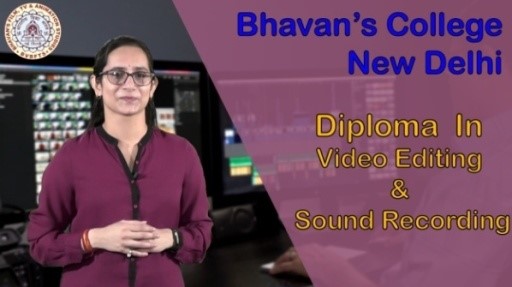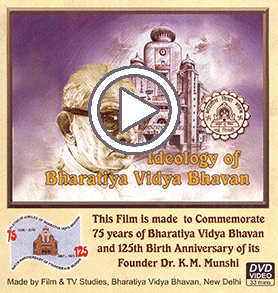Diploma in Video Editing and Sound Recording (EDT) |
The Editor is a (story) builder. He not only interprets a story in his own way, but also 'creates' something that was not visualized at the time of writing and shooting the Film. The combined knowledge of Video Editing and Sound Recording is most important for maintaining technical harmony in the Editing. This career has plenty of job opportunities with TV studios and News Channels. Students get essential knowledge about Linear Editing to develop Editing sense and full practice on Non Linear Editing, special effects and Sound Recording. All theory lectures are followed by practicals in studio and Editing on Computer. Students learn all aspects of computer from basic level and practice to become confident video editor.
Scope: |
You can work as a Video Editor with any TV Channel and Production House. Can work as a Freelance Video Editor or Sound Recordist. Can setup Non-Linear Video Editing Studio at home with own Computer. |
Eligibility: |
12th Pass |
Timing: |
11.00 am to 2.00 pm. 6 days in a week. 3 days theory and 3 days practical & project. Full time involvement is required for assignments & projects. Extra time for Computer classes. |
Duration: |
One academic year |
Watch the video below for more information.
After 12th, join the Diploma in Video Editing and Sound Recording. This is best course to get job early, and get highly paid within two years of practice. This video is made by our student of video editing. He will explain you what all you learn and how you can be successful editor. Watch the video. Duration: 3 mins |
 |
Examination Pattern
Group A – Internal Examinations
Programme is divided into two semesters, and
there will be an examination at the end of each semester. Also
there will be Evaluation Task at the end of every month as a one
paper covering all subjects and topics of theory and practical
covered during that month of study. Marks of these internal
examinations will be notified on final marksheet.
Internal
examinations as Evaluation Task (E.T.) and assignments will
be held at the end of August, September, October, November,
January, February and March.
Students must appear and pass in minimum 5
E.T. and minimum 5 assignments.
Each Evaluation Task (E.T.) of 50 marks X 5 papers |
= |
250 marks |
Each assignment of 50 marks X 5 assignments |
= |
250 marks |
Total (Group A) |
= |
500 marks |
Group B – Final Examinations
Paper I to Paper V, towards end of 1st Semester.
Paper VI to Paper VIII, towards end of 2nd Semester
Paper I |
Fundamentals of Visual Media (Photography & Videography) |
50 marks |
Paper II |
Fundamentals of Video Editing and Sound Recording |
50 marks |
Paper III |
Computer Application (Theory and Practical) |
50 marks |
Paper IV |
TV Direction and Production Technique |
50 marks |
Paper V |
Life Management |
50 marks |
Paper VI |
Video Editing with VFX (Advance) |
50 marks |
Paper VII |
Computer Application for Editing and basic Animation |
50 marks |
Paper VIII |
Business of Video Editing and Digital Media |
50 marks |
Each paper of 50 marks X 8 papers = |
400 marks |
|
|
Total (Group B) = |
400 marks |
|
Note: To qualify, student must pass all papers.
Group C – Other Evaluations
1. |
Participation in Practicals & Projects during 1st Semester |
100 marks |
2. |
Participation in Practicals & Projects during 2nd Semester |
100 marks |
3. |
Practical Examination in the month of January |
50 marks |
4. |
Practical Examination in the month of April |
50 marks |
5. |
Skill Test for 1st Semester in December |
50 marks |
6. |
Skill Test for 2nd Semester in March |
50 marks |
7. |
Internal Assessment as per attendance, general behaviour, sincerity in class work, homework, submission etc. |
100 marks |
Total (Group C) = |
500 marks |
|
Group A + Group B + Group C = |
(Total) |
|
To qualify for Diploma, student must secure 35% marks in individual subject and 40% aggregate. He/She must attend 80% of the theory and practical classes. And submission of all assignments are compulsory.

















